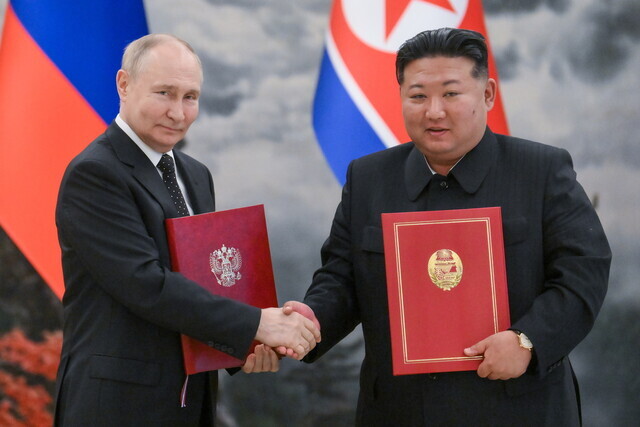hankyoreh
Links to other country sites 다른 나라 사이트 링크
North Korea’s real motive for publishing the full text of new treaty with Russia

On Thursday, North Korea unceremoniously released the full text of its newly inked strategic partnership treaty with Russia. Article 4 of the agreement states, “In case any one of the two sides is put in a state of war by an armed invasion from an individual state or several states, the other side shall provide military and other assistance with all means in its possession without delay in accordance with Article 51 of the UN Charter and the laws of the DPRK and the Russian Federation.”
The DPRK stands for Democratic People’s Republic of Korea, the full name of North Korea.
The release of the document, formally titled the “DPRK-Russia Treaty on Comprehensive Strategic Partnership,” is considered unusual given the lack of precedent for immediately disclosing the full text of bilateral treaties and the fact that Russia chose not to release it.
That raises the question of why North Korea published the text of the treaty.
North Korean leader Kim Jong-un mentioned the word “alliance” several times during a press statement following his summit with Russian President Vladimir Putin in Pyongyang on Wednesday, asserting that “relations between our countries have risen to a new high level of alliance.”
But Putin, for his part, did not use the word “alliance.”
Some analysts see this as representing an interpretive and operational disagreement between the two leaders.
Compared to the Treaty of Friendship, Cooperation and Mutual Assistance that North Korea and the Soviet Union signed in 1961, this new treaty differs in that it specifies conditions to which each party is obligated.
The former states that “should either of the Contracting Parties suffer [an] armed attack by any State or coalition of states and thus find itself in a state of war, the other Contracting Party shall immediately extend military and other assistance with all the means at its disposal.”
The latest treaty, however, stipulates that should North Korea or Russia be “put in a state of war by an armed invasion from an individual state or several states, the other side shall provide military and other assistance with all means in its possession without delay in accordance with Article 51 of the UN Charter and the laws of the DPRK and the Russian Federation.”
Strictly speaking, according to Russia’s diplomatic conventions, the “comprehensive strategic partnership” declared by Putin and Kim is a step down from an official alliance. Yet the latest treaty certainly appears to have included the language of an official military alliance — something North Korea likely could not compromise on.
In such circumstances, Kim and the North Korean authorities appear to have published the entire text of the treaty to show the world that the new pact has the properties of an alliance.
“While North Korea clearly wanted to emphasize an official alliance structure, Russia seemed to emphasize the defensive nature of the agreement [including Article 51 of the UN Charter] while avoiding calling the agreement an alliance,” a former high-ranking intelligence official told the Hankyoreh.
“To quell any misinterpretations or misunderstandings, Kim Jong-un rushed to publish the entire text of the agreement, as if to tell the world that there is no undoing this alliance,” he added.
By Park Min-hee, senior staff writer
Please direct questions or comments to [english@hani.co.kr]

Editorial・opinion
![[Editorial] Silence won’t save Yoon [Editorial] Silence won’t save Yoon](https://flexible.img.hani.co.kr/flexible/normal/500/300/imgdb/original/2024/0701/681719819632087.jpg) [Editorial] Silence won’t save Yoon
[Editorial] Silence won’t save Yoon![[Column] The miscalculations that started the Korean War mustn’t be repeated [Column] The miscalculations that started the Korean War mustn’t be repeated](https://flexible.img.hani.co.kr/flexible/normal/500/300/imgdb/original/2024/0630/9717197068967684.jpg) [Column] The miscalculations that started the Korean War mustn’t be repeated
[Column] The miscalculations that started the Korean War mustn’t be repeated- [Correspondent’s column] China-Europe relations tested once more by EV war
- [Correspondent’s column] Who really created the new ‘axis of evil’?
- [Editorial] Exploiting foreign domestic workers won’t solve Korea’s birth rate problem
- [Column] Kim and Putin’s new world order
- [Editorial] Workplace hazards can be prevented — why weren’t they this time?
- [Editorial] Seoul failed to use diplomacy with Moscow — now it’s resorting to threats
- [Column] Balloons, drones, wiretapping… Yongsan’s got it all!
- [Editorial] It’s time for us all to rethink our approach to North Korea
Most viewed articles
- 1Japan is building a military meant for more than self-defense — and has the US to thank for it
- 2[Column] The miscalculations that started the Korean War mustn’t be repeated
- 3[Editorial] Silence won’t save Yoon
- 4Yoon’s prosecutors are throwing everything at the president’s opponents to see what’ll stick
- 5Dreams of a better life brought them to Korea — then a tragic fire tore them apart
- 6Kim Jong-un says N. Korean nukes aren’t just for deterrence
- 7The greatest Korean film of all time, as selected by local industry experts
- 8South Korea creates more US jobs via direct investment than any other county
- 9NewJeans rocks Tokyo Dome as new, younger generation of K-pop fans emerges in Japan
- 10Gangnam’s sex industry